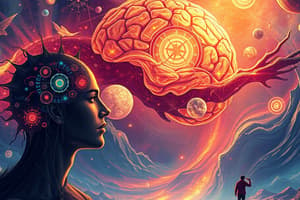Podcast
Questions and Answers
What is cognition?
What is cognition?
Processing
What is behavior?
What is behavior?
Reaction
What are the types of motivation?
What are the types of motivation?
- Cognitive
- Learned (correct)
- Biological (correct)
- Stimulus (correct)
What are the sources of motivation?
What are the sources of motivation?
Reactions and motivations are neutral.
Reactions and motivations are neutral.
What are the three components of emotions?
What are the three components of emotions?
Which emotions are considered basic, innate, and universal?
Which emotions are considered basic, innate, and universal?
What does cognitive appraisal involve?
What does cognitive appraisal involve?
Flashcards are hidden until you start studying
Study Notes
Cognition and Behaviour
- Cognition is the process of information processing
- Behaviour is the reaction to stimuli
- Decisions are complex and influenced by consciousness
- We focus on specific stimuli and process information in unique ways
- There is a relationship between sensation, perception and reaction
Motivation
- Motivation is the process behind initiating, sustaining, directing, and stopping behaviour
- Types of motivation include:
- Biological Motivation
- Stimulus Motivation
- Learned Motivation
- Motivation can come from internal sources or external sources
Emotion
- Emotions influence our reactions and motivations
- Emotions are mediated by emotional states
- We experience strong feelings when we achieve or fail
- Past experiences influence our emotions
- Emotions have three components:
- Physiological arousal
- Outward physical displays
- Subjective feeling states
Types of Emotions
- There are basic, innate, and universal emotions that are linked to survival
- The amygdala and limbic system are involved in processing emotions
- Power and Dalgliesh (2008) identified five basic emotions:
- Fear
- Anger
- Happiness
- Sadness
- Disgust
- Colibazzi et al (2010) proposed a dimensional theory of emotions:
- Valence (pleasant-unpleasant continuum)
- Arousal (excited or relaxed)
- Distinct brain networks are associated with different emotional states
- Each emotional state has typical action patterns
- Adults regulate emotions
Cognition & Emotion
- Thoughts are part of emotional responses
- Memories and beliefs influence our feelings and how we make sense of the world
- Cognitive Appraisal:
- We interpret sensory information
- We decide how relevant information is
- We identify if something is good, bad, or threatening
- We then select a behaviour based on the information and feelings
Studying That Suits You
Use AI to generate personalized quizzes and flashcards to suit your learning preferences.




